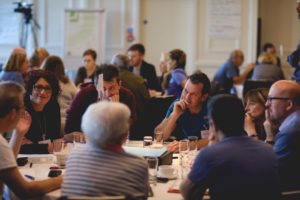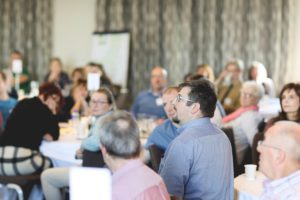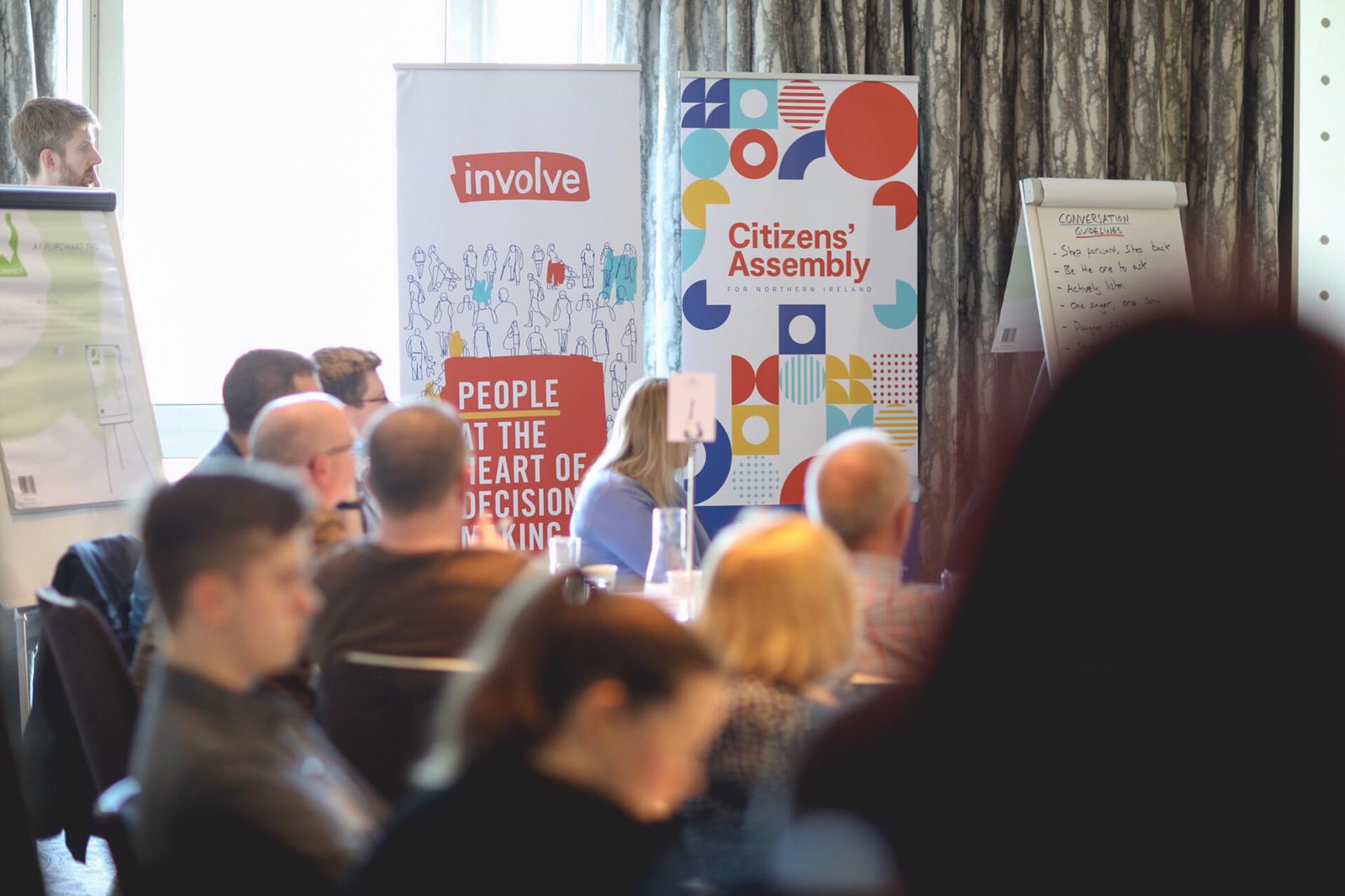The first Citizens’ Assembly for Northern Ireland met in Belfast this weekend. Jamie Pow, who sits on the Advisory Group of the initiative, writes up some of his observations from this democratic innovation in action. You can keep up to date with the work of the Citizens’ Assembly on Twitter @CA4NI.
Democracy hasn’t been in great health lately in Northern Ireland, to put it mildly. Even before the collapse of our devolved institutions last year, survey evidence found that over 70 percent of people were dissatisfied with the way democracy works here, 66 percent said they distrusted political parties, and only 11 percent said they thought the Northern Ireland Assembly had achieved “a lot.”
To overcome this democratic deficit and rebuild trust in the political system, there’s clearly a lot of work to do. But we have to start somewhere. If democracy, at its very core, amounts to rule by the people, then why not turn to the people themselves?
A citizens’ assembly in action
Over the weekend, 77 people from across Northern Ireland met at the Europa Hotel in Belfast to consider the future of the social care system for the elderly. This ‘mini-public’ was selected by LucidTalk to be representative of the broader population. Coming from every constituency, the participants broadly mirrored Northern Ireland’s demographics by gender, age, national identity, community background and socio-economic status.
Together, they constituted Northern Ireland’s very first Citizens’ Assembly. (By the way, if you think 77 is an odd number, that’s because 80 people had been recruited to the final representative sample. In other words, 96% of the participants recruited actually showed up – giving up pretty much an entire weekend – to take part in a largely unfamiliar kind of democratic exercise. And people are supposed to be disengaged from politics? Perhaps it depends on the kind of politics…)
“What I really enjoyed about this, and why it’s really appealing to me, is that it’s proactive, it’s engaging,” said Ruth, one of the members of the Citizens’ Assembly from Gilford. “There’s an equality about looking at the demographics of the people who are here, who wanted to participate, that has really enlivened me,” she added.
The very willingness of citizens like Ruth to give up their time and give this initiative a chance demonstrates that, in spite of a seemingly negative political landscape, ‘ordinary’ people are more than capable of actively participating in politics when given a meaningful opportunity to exercise their civic duty.
This type of democratic innovation has already been used in Canada, England, the Netherlands and the Republic of Ireland, when government or parliamentary bodies have sought the informed views of the public to help navigate the way forward on a contested or sensitive issue. The core idea is that a representative group of citizens comes together, they are presented with information and arguments from a range of experts and relevant stakeholders (who they get the chance to question), and then they deliberate on the best way forward before coming up with their own considered recommendations.
Over a year in the making, and partly inspired by a report called ‘Beyond Voting’, the Citizens’ Assembly became a reality in Northern Ireland thanks to funding provided by several civil society organisations (the Building Change Trust, the Community Foundation for Northern Ireland, the Paul Hamlyn Foundation and Open Society Foundations) and thanks to the expertise and logistical work of Involve, the UK’s leading public participation charity.
The issue of social care
On this occasion, the Citizens’ Assembly for Northern Ireland has been tasked with examining the specific issue of social care for the elderly. There may not be a functioning Assembly or Executive at the moment, but that doesn’t mean that the challenges facing the social care system have simply been put on hold. Quite the opposite: with an aging population and limited resources, the already daunting challenges are only continuing to mount. Choices will have to be made, sooner or later.
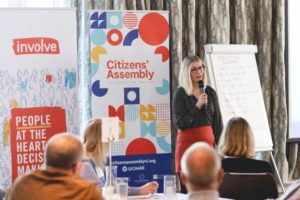
Dr Alexandra Chapman of Ulster University introduces members to the background of the social care system (Photo credit: Involve)
At the start of the weekend, the Citizens’ Assembly heard directly from Chris Matthews, Director of Mental Health, Disability and Older People at the Department of Health. Even in the current absence of devolved government, he emphasised that when – not if – a Health Minister is in place, the informed recommendations of the Citizens’ Assembly will be sitting waiting on his or her desk on Day One.
The 77 members certainly had their work cut out. This weekend, the first of two, was mainly about learning. Here is a brief flavour of the range of presenters and their contributions:
- Dr Alexandra Chapman (Ulster University), covering the background of social care and the context of how it is currently provided;
- Dr Gemma Carney (Queen’s University Belfast), taking the ‘long view’ of an aging population;
- Sean Holland (Chief Social Worker) and Eddie Lynch (Commissioner for Older People) on the challenges facing the social care system in Northern Ireland;
- Eithne Gilligan (Head of Policy and Engagement, Age NI), Clare-Anne Magee (Head of Carers NI) and Emma Weaver (Manager of Older People’s Services at Inspire Wellbeing) on what could be improved;
- Charlotte McArdle (Chief Nursing Officer), Patricia Higgins (NI Social Care Council) and Pauline Shepherd (CEO of Independent Health and Care Providers) on the challenges and options for delivering a sustainable service.
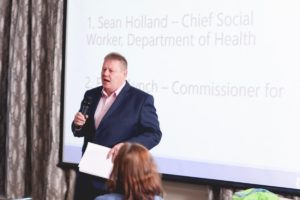
Sean Holland, Chief Social Worker, talking to the Citizens’ Assembly for Northern Ireland (Photo credit: Involve)
Perhaps most significantly, participants also heard from users of social care directly. Martin, who lives with dementia, and Robert, whose wife received domiciliary care, courageously shared their personal testimonies of how the system delivers in practice. You could hear a pin drop in the room as the members absorbed these lived experiences, having the fundamentals of the issue brought to life in a very powerful way.
The insights from the presentations were valued, as reflected by plenty of diligent note-taking around the room and the thoughtful – and often challenging – questions the citizens put to the presenters.
“Part of what I really enjoyed over the weekend was having different speakers come in, giving their expertise, so that it means we can make informed choices going into the next weekend,” said Francis, a participant from Newtownabbey.
After each set of presentations, members engaged in facilitated discussions to reflect on what they had heard and to identify the issues they felt were the most important. This wasn’t about arguing against each another in any kind of adversarial debate, but rather about deliberating with one another to try and tease out the problems together. Different points of view certainly emerged, often passionately articulated, but the constructive energy around the room – and the collegial atmosphere – was palpable.
“What was striking, I thought, was really how much agreement there was,” observed Iona, a member of the Citizens’ Assembly from County Down. “There were 80 people. There were different ideas coming, but everyone was very respectful of each other, and by and large there was agreement on what the problems are.”
Despite our well-known political differences in Northern Ireland, the members of the Citizens’ Assembly have shown how it is possible to find a common purpose, at least on this particular issue, when people are given the space to do so.
What comes next?
The Citizens’ Assembly will meet over a second weekend in November. Having absorbed an intense flow of information, arguments and perspectives, the 77 members will reconvene to come up with a set of tangible recommendations. These will be officially submitted to the Department of Health.
The participants are aware that their recommendations will not be binding on any future Health Minister, but there is recognition that the work of the Citizens’ Assembly can help, rather than challenge, the work of elected politicians. Their work has the potential to meaningfully inform actual decision-making on a politically difficult issue.
One of the members, Adrian, says that he and his fellow members certainly want to have a constructive impact on future policy decisions – and they are taking their collective task very seriously: “When we come up with recommendations, for whatever the subject is, whether it’s a politically awkward one or whether it’s something that’s just big and complicated like this one is, when we come up with ideas, it should allow the politicians to say, ‘Great. We now know this is what a wide spectrum of public opinion is. We can feel safe to go ahead with it.’”
Adrian and other members already see the potential benefit that a Citizens’ Assembly could have in other areas of decision-making in Northern Ireland, particularly when political parties feel unable to reach agreement on the best way forward amongst themselves.
This is not to say that this Citizens’ Assembly or other similar initiatives in the future will have all of the answers. But they can help. Part of the purpose of this exercise is to inject new possibilities into a political process in which far too many people appear to have given up. Citizens’ assemblies should not be seen as an alternative to existing institutions, or as a challenge to the role of politicians. Instead, by complementing elected institutions, they might just help them to function better whenever they are restored. And yes, perhaps this kind of deliberative vehicle could help to get Northern Ireland’s institutions back on track in the first place.
So, in the meantime, let’s see what the Citizens’ Assembly for Northern Ireland comes up with. The work of its members – our fellow citizens – deserves to be heard and taken seriously. For all the apparent political inactivity in Northern Ireland, this is what democracy can look like, if it’s given the chance.
I, for one, am already looking forward to seeing the Citizens’ Assembly return to action next month. When I asked one woman on the way out if she was looking forward to coming back, she replied without hesitation: “Absolutely. It gives me so much hope.” I couldn’t agree more.
For more information about the Citizens’ Assembly for Northern Ireland, there is a Q&A section on its official website.
There was also a panel discussion about the Citizens’ Assembly on BBCNI’s The View ahead of the meeting.
Also published on Medium.

